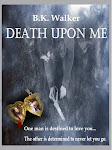Today I have the pleasure of interviewing author Jonathan Maxwell. We will be discussing his book, Piltdown Man and Other Hoaxes, available now on Amazon.
Welcome Jonathan!
MM: Many authors
relate their characters to people they know.
Is this the case with your characters and do you see yourself in any of
them?
JM: I write
non-fiction, so things are a bit different.
However, I did relate to many of the persons I discussed in Piltdown Man and Other Hoaxes. The major players in the whole Piltdown
affair were all fascinating individuals, larger-than-life, a complex mixture of
good and bad. Sometimes they were
admirable, and sometimes not-so-much.
They weren’t always right, but they were always impassioned, and always
opinionated. In other words, they were
distinctly human. Everyone can relate to them, if they give
them a chance.
MM: Who is your
favorite character in your book and why?
JM: Charles Dawson,
but for all of the wrong reasons. He’s
not exactly a moral figure, but he’s just so interesting, you find yourself not
caring that he’s immoral. He represents
a common truth found not just in literature, but in all of human society. People are drawn to morally ambiguous characters. They may not trust them, they may not admire
them, but they always find them somehow beguiling. It’s like with Dracula—yes, he’s villainous,
but he’s also strangely seductive as well.
Oftentimes, we secretly want to be Dracula. I guess it’s because such characters don’t
follow the rules.
MM: Who is your most
favorite character from any book of all time?
JM: I’m getting my
Master’s of English, and, in Victorian Literature, we just read Great Expectations. I have to admit it, but I didn’t look forward
to reading it. It sounded stuffy. I really enjoyed the book, though. Pip was just such an endearing
character. On the one hand, he was just
so friendly and sweet. On the other
hand, he was so incredibly ambitious and driven. You root for Pip, and you want him to become
a success. Still, you worry that he’s
losing his values, that he’s selling out, that he’s abandoning his best friends
in his pursuit of success. He’s a
complicated character, and its complicated characters that produce great
literature.
MM: If you could dive
into the pages of any book, which book would it be and what character would you
be?
JM: I suppose
Pip. His story is very exciting. He’s a humble blacksmith apprentice, resigned
to a life of hard, dirty work. Then, he
suddenly discovers that he has high friends in high places. An anonymous benefactor comes forward,
willing to make him a wealthy member of high society. The benefactor pays for his schooling, his rent,
his food, and even his social life. He’s
not supposed to ask who this mysterious benefactor is. He’s just supposed to collect the money. Of course, not knowing who the stranger is
simply drives Pip crazy. And,
eventually, he discovers the identity of the stranger—and the figure is
definitely not what Pip expects, or even wants.
It’s just a classic story. It’s a
shame that a lot of younger readers don’t care for “older” literature these
days. There’s some great stuff there.
MM: If your book was
to become a movie, which actors/actresses do you see playing the parts of your
characters?
JM: Richard Dreyfuss
would be great as Charles Dawson, I think.
This seems like an odd choice—this actor isn’t young, and he’s not a
typical leading man. Still, he looks a
lot like Dawson. More importantly,
they’re both larger-than-life figures.
They’re both egocentric but likable.
They believe in themselves.
They’re both extremely sociable.
They’re doers, and while they’re both impulsive, you instinctively
believe in them and whatever they’re doing.
MM: What can we
expect from Jonathan Maxwell in the future? Any new projects?
JM: My latest
manuscript is about the Rolling Stones’ experience at Altamont. This was a free concert held by the band in
California in 1969. They made the
horrendous mistake of hiring the Hell’s Angels motorcycle gang to provide
security at the event. Once there, half
of the bikers decide to wage war on the concertgoers, beating them with their
fists and with bats. Apparently, the
other half decided to sell the concertgoers hard drugs. What were the results? Among the results were one cold-blooded
murder, three additional deaths, hundreds of violent assaults, and thousands of
drug overdoses. Commentators often claim
that Altamont spelled the deaths of the hippie movement and of the spirit of
the 1960’s. I think that the
commentators are pretty right on.
MM: Where can readers
connect with you?
JM: Listeners can
find my book at Barnes & Noble, and on www.amazon.com. They are welcome to contact me on Facebook.
Thank you so much for taking time to chat with me today.
It's been a wonderful pleasure.
I'm a Georgia-based writer and editor. My first book,
Murderous Intellectuals: German Elites and the Nazi SS, was released in
November 2009. A history of the Nazi party, the book can be found at
www.amazon.com.
I'm a writer. My first book came out in November, 2009. It's
called Murderous Intellectuals: German Elites and the Nazi SS.
Around the turn of the century, mysterious bones are found on a work site in otherwise sleepy Piltdown, England. They look very old, perhaps prehistoric. The bones clearly belong to a primate, but what kind? Some of them look extremely primitive, while others appear to be those of a modern human being. Despite the paradoxes, British scientists hail the specimen as the first man. Thus, humankind originated in Europe, and not in Africa, as Charles Darwin believed. However, things are not quite what they seem, and Western scientists would endure a scandal that would almost destroy anthropology and the theory of evolution. Piltdown Man and Other Hoaxes examines this disastrous fraud in depth, and explores other scientific scandals as well, such as those in regards to Bigfoot, the Yeti, lake monsters, and mermaids.
- Paperback: 248 pages
- Publisher: American Book Publishing (April 26, 2012)


















.jpg)
.jpg)












































0 comments:
Post a Comment